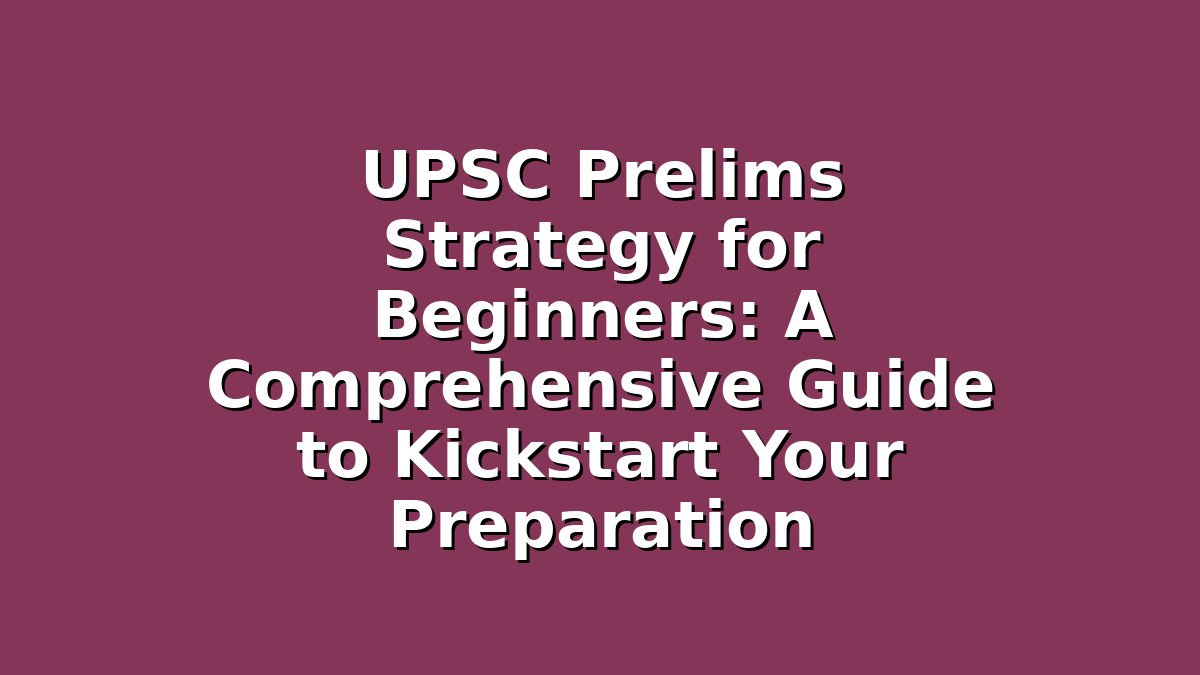Preparing for the UPSC Civil Services Examination can seem like a daunting task, especially for beginners. The Preliminary exam, or Prelims, is the first and crucial step in this competitive journey. It tests your aptitude, general studies knowledge, and ability to analyze issues critically. With lakhs of aspirants appearing every year, having a clear, well-structured strategy is essential to clear this stage and move forward. If you are just starting your UPSC preparation or looking for effective study tips, this guide is tailored to help you build a strong foundation and approach your Prelims preparation with confidence.
Understanding the UPSC Prelims Exam Pattern and Syllabus
Before diving into detailed strategies, it’s important to understand the exam’s format and syllabus. The UPSC Prelims consists of two papers:
– General Studies Paper I: This covers History, Geography, Polity, Economy, Environment, Science & Technology, and Current Affairs. It’s a multiple-choice questions (MCQs) paper of 200 marks with 100 questions.
– General Studies Paper II (CSAT): This tests comprehension, logical reasoning, basic numeracy, and decision-making skills. It is qualifying in nature, requiring candidates to score at least 33%.
Knowing the syllabus thoroughly helps you identify the topics that carry more weight and require focused preparation. For beginners, it’s advisable to download the official UPSC syllabus from the UPSC website and keep it handy throughout your preparation.
Section 1: Build a Strong Foundation with NCERTs and Basic Resources
One of the biggest mistakes beginners make is jumping straight to advanced books or coaching material. Instead, start with NCERT textbooks from classes 6 to 12. These books are written in simple language, cover the basics extensively, and provide a solid understanding of core subjects like History, Geography, Polity, and Science.
– Why NCERTs?
NCERTs are considered the backbone for UPSC preparation because they help you grasp fundamental concepts without getting overwhelmed. For example, the NCERT History books help you understand Indian heritage and freedom struggle narratives in a crisp, chronological manner.
– How to use NCERTs effectively?
Read one subject at a time. For History, start with ancient India and gradually move to medieval and modern. Make notes or highlight key points, dates, and definitions. For Geography, focus on physical geography and Indian geography sections first.
Once you finish NCERTs, gradually move to standard reference books like Laxmikanth for Polity, Ramesh Singh for Economics, and Bipin Chandra for Modern Indian History. This layered approach ensures your knowledge builds systematically.
Section 2: Develop a Habit of Current Affairs Reading and Analysis
Current affairs play a vital role in the UPSC Prelims exam, especially for the General Studies Paper I. Many questions are directly or indirectly based on recent events, government schemes, international relations, and environmental issues.
– Daily Newspaper Reading
Start reading a quality English newspaper like *The Hindu* or *Indian Express* daily. Focus on editorials, national news, government policies, and international developments. Beginners should allocate at least 30-45 minutes every day for this.
– Monthly Current Affairs Magazines and Online Resources
Supplement your newspaper reading with monthly compilations from reputed UPSC coaching institutes or websites. Sources like PIB (Press Information Bureau) and Yojana magazine are excellent for government schemes and policy updates.
– Make Notes and Revise Regularly
Instead of trying to remember everything, develop the habit of making concise notes. Use bullet points, flowcharts, and headings to organize information. Regularly revise these notes to ensure better retention.
– Understand, Don’t Memorize
For current affairs, understanding the context and implications is more important than rote learning. Try to analyze how a particular policy impacts the economy, society, or international relations.
Section 3: Practice Mock Tests and Question Papers for Time Management and Accuracy
Prelims is a highly competitive exam where even a small difference in marks can determine your success. Developing exam temperament, speed, and accuracy is as important as having good content knowledge.
– Start Attempting Mock Tests Early
Once you have covered basic topics and some current affairs, begin solving mock test papers. Choose tests designed specifically for UPSC prelims, which reflect the difficulty level and pattern of the actual exam.
– Analyze Your Performance
After every mock test, spend time analyzing your mistakes, question patterns, and time taken for each section. Identify weak areas and revise topics accordingly. This feedback loop improves your preparation over time.
– Improve Time Management
The Prelims exam has 2 hours for each paper, so practice completing papers within this timeframe. Develop the skill to quickly eliminate wrong options and avoid spending too much time on difficult questions.
– Strengthen CSAT Preparation
Since CSAT is qualifying, it’s important to secure at least 33% marks. If you’re weak in aptitude or reasoning, dedicate regular practice to these areas using specific CSAT preparation books and online resources.
Conclusion
Starting your UPSC Prelims preparation might seem overwhelming, but with the right approach and consistent effort, you can definitely crack it. Begin by understanding the syllabus and exam pattern thoroughly. Build a strong foundation with NCERT books, and gradually move to advanced materials. Incorporate daily current affairs reading into your routine and maintain your own notes for better revision. Most importantly, practice mock tests regularly to hone your exam-taking skills and manage time effectively. Remember, UPSC is not just about hard work but also about smart work and strategic planning.
Stay patient, stay motivated, and believe in your ability to succeed. Every aspirant’s journey is unique, so find what works best for you and keep adapting your strategy as you progress. With dedication and the right mindset, the UPSC Prelims can be your stepping stone towards a rewarding career in civil services.

Responses